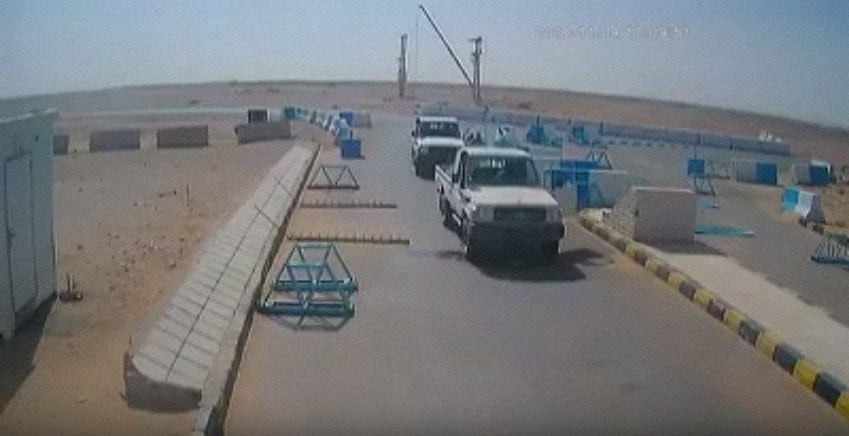The families of three Army Green Berets killed in Jordan two years ago filed a lawsuit against the country’s ruling royal family this week accusing the kingdom of attempting to cover up an alleged terrorist attack.
The families are seeking monetary damages from Jordan as punishment, as well as answers to the killer’s motive, according to court documents obtained by Army Times.
The lawsuit was filed Friday in U.S. District Court in Washington, D.C., under the Anti-Terrorism Act. The documents also said that Jordan’s mishandling of the incident forfeited its right to claim foreign sovereign immunity in the case.
“Their families seek justice for their unnecessary deaths and believe that the Hashemite Kingdom of Jordan aided and abetted this terrorist act by seeking to silence the families,” the court documents read.
The three U.S. Army Special Forces soldiers were killed by a gate guard as they returned to King Faisal Air Base on Nov. 4, 2016, where they staged missions to train and equip foreign fighters opposing the Bashar al-Assad regime in nearby Syria.
The three soldiers killed in the attack were Staff Sgt. Matthew Lewellen, 27, Staff Sgt. Kevin McEnroe, 30, and Staff Sgt. James Moriarty, 27.
The Jordanian soldier involved in the shooting, 1st Sgt. Marik al-Tuwayha, but also known as Abu Tayeh, was sentenced to life in prison, though the families of the fallen soldiers sought the death penalty.
The lawsuit alleges that Abu Tayeh was acting on behalf of the Islamic State. However, a military investigation found no motive for the attack.
Abu Tayeh pleaded not guilty in the case, claiming he opened fire because he thought the Americans posed a threat after failing to stop their vehicle when they approached his guard post. However, U.S. Special Operations Command’s investigation into the incident said that it was standard procedure not to stop American vehicles.
“No ID card checks or verbal questions were ever asked," the investigation reads. "It was assumed that the guards knew the vehicles all the instructors regularly drove and the presence of Caucasian men with beards was all the verification the guards needed.”
The Jordanian kingdom rolled out a series of shifting explanations in the wake of the incident, first alleging that the Americans did not follow proper protocol when entering the base. Jordanian officials then said that the Americans had been drinking alcohol prior to arriving at the base.
“There is no evidence that substantiates post-incident allegations and speculation that alcohol was involved,” the U.S. investigating officer, Air Force Maj. Gen. Marcus Hicks, wrote in his report.
Finally, Jordan claimed a loud noise instigated the gate guard’s lethal action. But the U.S. military investigation concluded there was no evidence that a loud noise occurred prior to the attack.
Dina Kawar, the Jordanian ambassador to the U.S., backed the kingdom’s narrative in a March 6, 2017, letter to U.S. lawmakers.
“The incident was the result of implementation of military rules of engagement following hearing gunshot near the main entrance to the base and the subsequent belief of an ongoing attack,” Kawar wrote.
However, a security camera at the gate recorded the incident and was eventually released following the investigation.
The soundless video shows an unprompted attack by Abu Tayeh, who was equipped with body armor and an M-16 assault rifle. The Green Berets did not have body armor and were equipped with only their service pistols. The attack lasted roughly six minutes.
McEnroe and Lewellen were in the first vehicle stopped and were killed immediately by Abu Tayeh, shot through the glass of their unprotected, civilian vehicle.
Moriarty and a fourth Green Beret who lived through the attack then dismounted their vehicles to seek cover.
After closing in on their position, Abu Tayeh shot Moriarty twice, mortally wounding him. The remaining Green Beret maneuvered around the attacker, shooting and seriously wound him, ending the incident.
McEnroe died at the scene. Lewellen and Moriarty were medically evacuated after receiving initial treatment at the local medical treatment facility but died en route to King Hussein Hospital in Amman.
RELATED

“As the video portrays, and as reported by the U.S. military in its investigation of the assault, none of the other Jordanian soldiers stationed at this gate took any action to bring the assault to a conclusion,” the court documents read.
The court documents allege that the Jordanian government gave Abu Tayeh a promotion and a medal following the incident.
“In short, Defendant Jordan rewarded Defendant Abu Tayeh for murdering three American soldiers in cold blood,” the documents read.
“By continuing to defend the actions of Defendant Abu Tayeh, Defendant Jordan was complicit in his act of terrorism," the lawsuit alleges. "Video of the assault removed any doubt from anyone who has viewed it that this assault was not ‘accidental’ nor was it within the rules of engagement.”
The lawsuit claims that Jordan waived its right to assert sovereign immunity in the case when a member of the kingdom’s military deliberately killed the three Americans who were entitled to diplomatic protection equivalent to consular staff.
Rather than investigating the incident honestly, Jordan provided Abu Tayeh “with safe harbor and substantial assistance in the form of international denials of culpability,” the court filings read.
The case has not yet been assigned a judge. The families of the Green Berets are represented by lawyers at Motley Rice LLC, one of the nation’s largest plaintiff litigation firms.
The U.S. government is Jordan’s single largest provider of bilateral assistance, providing over $1.7 billion in 2017, including $1.3 billion in bilateral foreign assistance and over $200 million in military support, according to the U.S. State Department.
Kyle Rempfer was an editor and reporter who has covered combat operations, criminal cases, foreign military assistance and training accidents. Before entering journalism, Kyle served in U.S. Air Force Special Tactics and deployed in 2014 to Paktika Province, Afghanistan, and Baghdad, Iraq.




